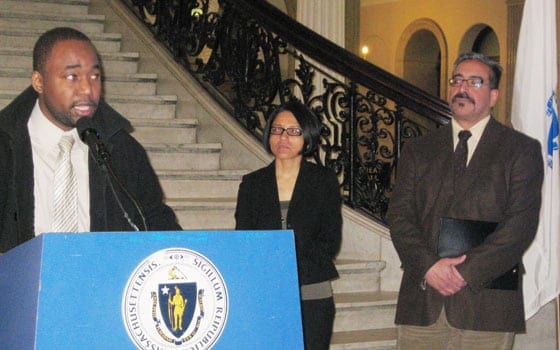
Throughout his campaign for president, Barak Obama pushed a platform that included immigration reform.
But as Congressional wrangling turned “yes we can” into “not this year,” the fate of the estimated 11 million undocumented immigrants receded to political purgatory.
In a bid to get immigration reform back on track, a national coalition of immigrant rights groups are taking their fight to the media, calling on newspapers, broadcast media and talk shows to stop what they say is a pattern of degrading depictions of immigrants.
“You only need to turn on Fox News or CNN or any talk radio show to hear a discourse full of xenophobia,” said Gabriel Camacho, an organizer with the American Friends Service Committee.
Last week, Camacho and other immigrants’ rights activists gathered at the State House to launch the Massachusetts arm of Somos/We are, a campaign sponsored by the National Alliance of Latin American and Caribbean Communities.
The group is calling on news media to stop referring to undocumented immigrants as “illegal aliens,” and to stop equating immigrants with terrorism and drugs.
“Even the so-called liberal press such as National Public Radio and the Boston Globe use terms like ‘illegal aliens,’” Camacho said. We think it’s a loaded term that conjures negative images. It characterizes us as on the margins of society and we’re not.”
Coalition members argue that human beings cannot rightly be characterized as illegal.
“Actions can be illegal, but not people,” says Patricia Montes, executive director of the Somerville-based immigrant rights group Centro Presente.
With negative stereotypes dominating the debate around immigration reform, it’s impossible for immigrants to be treated fairly, Montes argues.
“It’s a very toxic debate,” Montes said. “They don’t see immigrants as human beings — as people who give to this society.”
The demonization of immigrants in the public discourse has derailed key aims of the immigrant rights movement in Massachusetts, according to immigrant rights supporters.
The Massachusetts House and Senate have repeatedly voted down a law that would have given the children of undocumented immigrants who graduate from high school here the right to pay in-state tuition rates at public colleges and universities.
The immigrant rights movement is not without friends in the Massachusetts Legislature. Present at last week’s kickoff were state representatives Alice Wolf and Denise Provost.
“Until we have immigration reform, we do not have justice,” Provost said.
Nationally, immigrant rights groups are calling for labor protections for immigrant workers, repeals of laws that give local law enforcement the right to detain undocumented immigrants who have not committed crimes and protections for undocumented immigrants being held in detention facilities.
For those reforms to happen at the national level, the activists say, changes in perception must happen at the local level.
“It’s important that people recognize that we are human beings and that we have families, that we work hard,” said Evelyn Flores, a Salvadorean immigrant who serves on the board of Centro Presente.
“We are not criminals,” she said. “We are not taking jobs away from anyone.”


![Banner [Virtual] Art Gallery](https://baystatebanner.com/wp-content/uploads/2024/04/Cagen-Luse_Men-at-store-e1713991226112-150x150.jpg)



